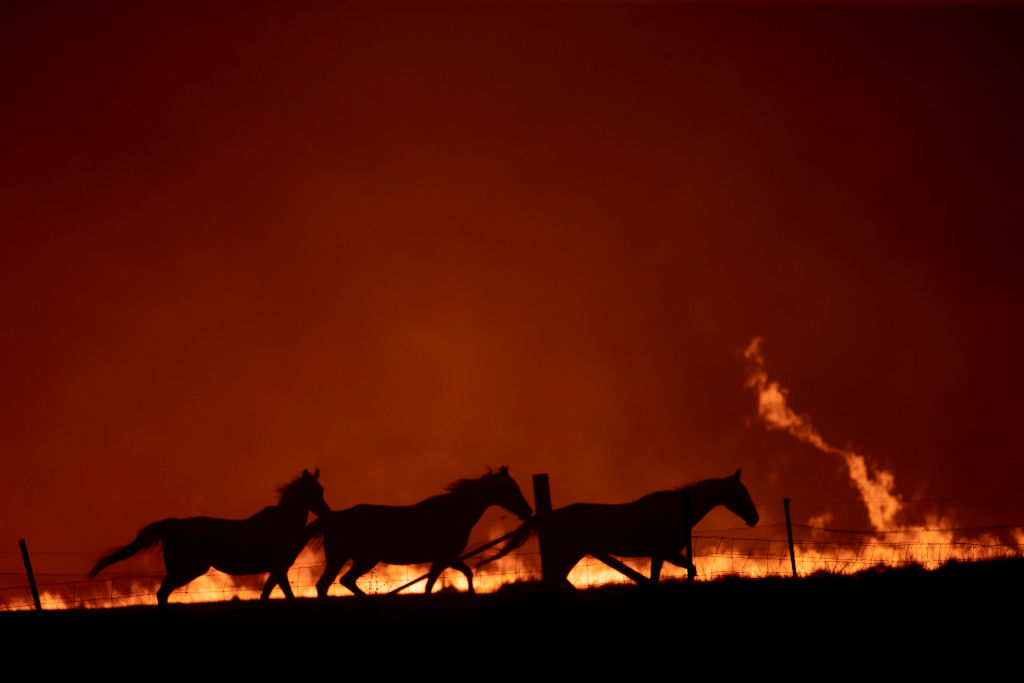The dangers of denialism
Posted By Mark Beeson on February 14, 2020 @ 06:00

‘You’re in denial.’ It’s a phrase no one wants to hear used about themselves as it suggests an unwillingness to confront or even recognise some unpleasant reality or other. The consequences for individuals are generally discomfiting rather than dangerous. Unfortunately, denialism is becoming a prominent part of public policy and international relations and the potential impact could be catastrophic.
The most obvious and potentially disastrous impact of denialism revolves around climate change. Despite an overwhelming, incontrovertible scientific consensus about the drivers and likely impact of climate change, many people remain in furious denial [1] about its very existence.
Some climate denialists are possibly just poorly informed or incapable of understanding the underlying science. I confess I still don’t have the firmest grip on some of the technicalities myself, but I’m more than happy to take the word of those who do, and who are recognised as experts [2] by their peers. What possible basis could I have for disagreeing? This is, after all, the very essence of an intellectual division of labour of which I am an enthusiastic part.
Of more concern are the denialists who do understand scientific evidence but choose to undermine or discount it because they benefit from doing so. The tobacco and coal lobbies [3] have been notorious examples of this approach, but they are far from alone. Their actions may be reprehensible, but they are at least understandable.
Most worrying, though, are denialists who are in positions of power, but who really don’t seem to have any real grasp of the issues, or who rely on their own ‘alternative facts’ [4] to justify implausible and inappropriate policies. Unfortunately, the most powerful man in the world is one such person.
Donald Trump is not simply famous for his support of the fossil fuel industry and his attacks on Obama-era environmental protections; many of his supporters are in denial about the man himself. Given Trump’s appeal to poorly educated voters [5] who feel aggrieved and condescended to by what they see as self-serving elites, perhaps they can be forgiven for thinking their hero represents their interests and has a handle on complex domestic and foreign policy issues.
Members of the Republican Party have no such excuse, however. Anyone who has been taking even a passing interest in American politics ought to know that Trump is one of the most unqualified, astoundingly ill-informed and morally bankrupt leaders in American history. And yet the GOP—with the noteworthy exception of Mitt Romney—denies this because its members think [6] that Trump will win them the next election.
It is hard to deny they may well be right about that, at least. The dangerous consequences of denialism in the case of many American voters, vested interests and powerful political operators, however, is that another four years of Trump may make meaningful collective action on climate change impossible, undermine the so-called rules-based international order, destabilise American alliances around the world and generally make the world more ungovernable. Not to mention doing possibly permanent damage to democracy [7] in the US itself.
It is not just Americans who are in denial, however. As one of America’s closest allies, Australia, especially its security establishment, is also in denial about Trump’s impact on the international system. The great hope was that he would be thrown out at the next election and normal service would be resumed. That looks an increasingly unlikely prospect that has to be faced, as does the unpalatable reality that Trump’s America is an increasingly unreliable partner [8].
Many Australian strategic experts remain convinced that the US will not abandon us and that it remains the bedrock of the old order in which China was contained. That’s another belief that may collide with reality.
In the meantime, though, the defence establishment insists that the best way to respond to Australia’s unique strategic circumstances is by buying evermore trouble-plagued planes and submarines. The level of denial [9] about the cost and effectiveness of such high-profile acquisitions is setting a new benchmark for wilful ignorance and obfuscation.
The real danger of the strategic community’s ruling orthodoxy about the basis of national security is that it entirely misses the very tangible threat that has taken the lives and consumed the properties of Australians over the course of this summer.
No doubt the strategic hardheads in the Canberra bubble will deny that bushfires have anything to do with ‘real’ security issues. But if people dying as a result of an identifiable, well-understood threat that isn’t going to go away isn’t a security issue, it’s hard to know what is.
Admitting that we might have a new sort of threat to our collective security would be a step in the right direction. It might even help with the cognitive dissonance, high levels of anxiety and chronic insecurity [10] that people, particularly young ones, feel as a consequence of unmitigated climate change.
Yet we have to face the prospect that it may not be possible to address the existential security challenge that a rapidly changing natural environment presents. We certainly can’t respond effectively without a radical rethinking of our strategic priorities.
We need to collectively recognise that the nature of threats to our security in Australia has changed. It’s time to stop denying it.
Article printed from The Strategist: https://www.aspistrategist.org.au
URL to article: https://www.aspistrategist.org.au/the-dangers-of-denialism/
URLs in this post:
[1] furious denial: https://www.theguardian.com/australia-news/2020/jan/16/there-is-no-link-the-climate-doubters-within-scott-morrisons-government
[2] who are recognised as experts: https://www.nytimes.com/2017/03/21/books/the-death-of-expertise-explores-how-ignorance-became-a-virtue.html
[3] tobacco and coal lobbies: https://www.merchantsofdoubt.org/
[4] rely on their own ‘alternative facts’: https://theconversation.com/alternative-facts-do-exist-beliefs-lies-and-politics-84692
[5] appeal to poorly educated voters: https://www.economist.com/graphic-detail/2019/11/11/poorly-educated-voters-hold-the-keys-to-the-white-house
[6] because its members think: https://www.nytimes.com/2020/01/31/us/politics/republican-response-impeachment.html
[7] damage to democracy: https://www.ft.com/content/3749175a-4c17-11ea-95a0-43d18ec715f5?emailId=5e427b00ea2661000438adb6&segmentId=7d033110-c776-45bf-e9f2-7c3a03d2dd26
[8] an increasingly unreliable partner: https://www.quarterlyessay.com.au/essay/2017/11/without-america
[9] level of denial: https://www.theaustralian.com.au/business/economics/eminent-advisory-group-warned-of-submarines-debacle/news-story/1d715e2f41d315cd5c4f89717c5d4c6f
[10] cognitive dissonance, high levels of anxiety and chronic insecurity: https://www.theguardian.com/environment/2020/feb/10/overwhelming-and-terrifying-impact-of-climate-crisis-on-mental-health
Click here to print.